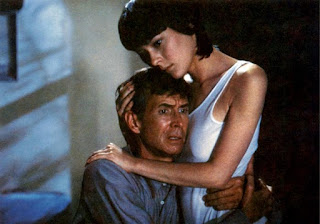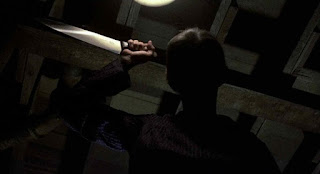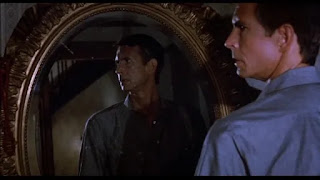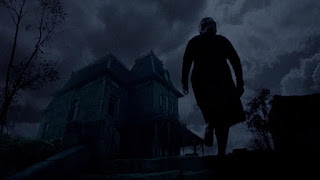Sequels have always presented an arduous challenge for filmmakers. But to make a sequel to Alfred Hitchcock’s Psycho (1960), the shocker that single-handedly changed the course of modern horror? That was more than just a challenge, it was an act of cinematic sacrilege. The idea of anyone attempting to make a Psycho II sounded like pure craziness, especially given the staggering twenty year plus gap between them. But then, we all go a little mad sometimes.
Inspired in part by his disdain for the slasher genre of the early ‘80s, and prior to the development of the Psycho II film, Psycho novelist Robert Bloch had his own idea for a continuation of Norman Bates’ story. Bloch had the still-nuts Norman escape from an asylum (by murdering a nun and dressing in her habit) and then trek to Hollywood to terrorize the makers of a movie based on his exploits (that it would’ve taken twenty some-odd years for Hollywood to make a movie out of Norman’s grisly deeds seems far-fetched but hey, whatever). Bloch’s Psycho II was published in 1982 but with its acerbic jabs at Hollywood and the way the storyline marginalized (and even discarded) Norman, it didn’t make for a viable candidate for a movie adaptation.
Still, with both slashers and sequels being all the rage in the early '80s, Universal recognized the strong commercial viability in the return of Norman Bates and set about mounting their version of Psycho II. Screenwriter Tom Holland (The Beast Within) was enlisted to create a storyline from scratch and in the director’s seat was ardent Hitchcock disciple Richard Franklin, who had previously proved his aptitude for suspense with the acclaimed Australian thriller Road Games (1981). The importance of having the right writer and director aside, the success of any attempt at a Psycho sequel hinged on the participation of Anthony Perkins. The actor’s (at first reluctant) decision to return as Norman was the essential casting coup that made Psycho II into a credible project. In the summer of 1983, the Bates Motel would be back in business. Cue the slashing violins!
From the instant a judge declares Norman fit to return to society, the sister of Norman's most famous victim, Lila Loomis (Vera Miles), formerly Lila Crane, is in the courthouse calling bullshit and waving a petition to keep this murdering menace locked up for life. Even though she comes across as a bit of a high-strung, haranguing bitch (though can you blame her?), audiences suspect Lila might be onto something as no sooner than Norman returns to the Victorian frame house he used to share with his mother’s corpse does he see someone in the window of Mother’s old bedroom. Worse than that, Norman starts finding notes for him left in his mother’s name. Is Norman losing it so soon, or is there another explanation?
While he – and the audience – are left to wonder what’s what, Norman scores himself a new job outside of the motel to keep himself occupied. He’s now working as a cook at the local diner and when he isn’t busy flipping burgers, he’s warming up to young waitress Mary Samuels (Meg Tilly). When Mary’s boyfriend dumps her, Norman does the gentlemanly thing and offers her a room at his motel. Unfortunately, when Norman goes to put Mary in a cabin he discovers to his horror that the man appointed by the state to run the motel in Norman’s absence, Warren Toomey (Dennis Franz), has turned the Bates Motel into – gasp! – a place where people go to indulge in all manner of “adult” and/or illegal activities. Naturally, Norman is outraged. Is Toomey trying to give the Bates Motel a bad name or what?
Norman’s puritanical reaction is a genius move on the part of Franklin and Holland. To have Norman, of all people, representing the voice of decency was a perfect way to sardonically comment on just how debased the world had become since 1960 while also establishing Norman as a weirdly virtuous character. It should be ridiculous – Norman is, after all, a serial killer. But Holland, Franklin, and Perkins collectively sell us on the idea of Norman as a chivalrous guy. Norman was always a sympathetic figure; it’s part of what made the original film so successful. But in Psycho II when he shows his backbone and fires Toomey, he’s like some '80s movie hero, taking out the trash. This isn’t Norman as the same stammering man-child he was in the original; this is Norman as a valorous man of principles who won’t be taking anyone’s shit. Pay attention, scumbags. There's a new sheriff in town and his name is Norman.
Holland, Franklin and Perkins knew how important it was that the audience be in Norman’s corner. If Norman came off as just being sketchy, the idea that Mary would consent to stay alone in his house would be impossible to accept and the movie would instantly fall apart. Although we find out later in the film that Mary has her own hidden motives for getting close to Norman, not knowing that at first, we have to believe upfront that this young girl would not be an idiot for trusting a former serial killer (no matter how “cured” the state claims he is) – much less to begin to fall in love with him.
Reportedly, Tilly and Perkins had an acrimonious relationship on the set but on screen, the budding romance of their characters has the convincing chemistry of two lost souls finding each other. Alas, as we find out here and in Psycho III (1986), love is just not in the cards for Norman. The guy has too much baggage and Mother never stays out of the picture for long. As viewers, we root for the tormented Norman to beat his demons and claw his way out of his private trap but Mother always has the last say when it comes to Norman's love life.
Whether Norman is really putting on a woman’s wig and dress again or not, someone who looks an awful lot like Mrs. Bates is up to multiple murder (with some nasty gore to be had – an absolutely brutal knife through the mouth gag rivals the most ghastly FX found in any ‘80s slasher movie) and until the last scenes, Holland and Franklin keep the audience on their toes as to what the solution to the film’s mystery is.
With all respect to Bloch as a genius of psychological horror and as the literary father of Norman Bates, Holland's script bested Bloch's novel as the better Psycho II story. Not only did Holland realize that in 1983, there'd be no need for Norman to break out of an asylum (instead, thanks to an overburdened judicial and mental health system, he'd be deemed cured and released), Holland also knew that this story needed to be about Norman, On every level, Holland's script made the right choices. It was more emotional, more surprising, and scarier to boot.
In 1983, the return of Norman Bates could’ve easily been treated as an occasion for camp. By that time, Psycho was so embedded in the cultural vernacular that its iconic moments had been parodied time and again, in everything from Mel Brooks' Hitchcock spoof High Anxiety (1977) to Brian DePalma's Phantom of the Paradise (1974). But Holland and Franklin wisely played it seriously.
Psycho II is very much a horror film of the Friday the 13th era (the death of a pot smoking teen trying to get into his girlfriend's pants in the cellar of the Bates home is a deliberate nod to the current conventions of the slasher genre) but unlike most of its competitors, Psycho II wasn't just about a body count. It's just that everyone involved in making Psycho II were savvy enough to know that in 1983 they needed to have one.
As an acolyte of Hitchcock, Franklin crafted Psycho II as a love letter to Psycho, filled with visual quotes and Easter Egg-style shout-outs to the original (including a slyly hidden cameo by the late director, with Hitch's signature shadow making an appearance) while contributing its own indelible moments to the Psycho saga (with the shockingly sudden shovel murder being a standout).















No comments:
Post a Comment